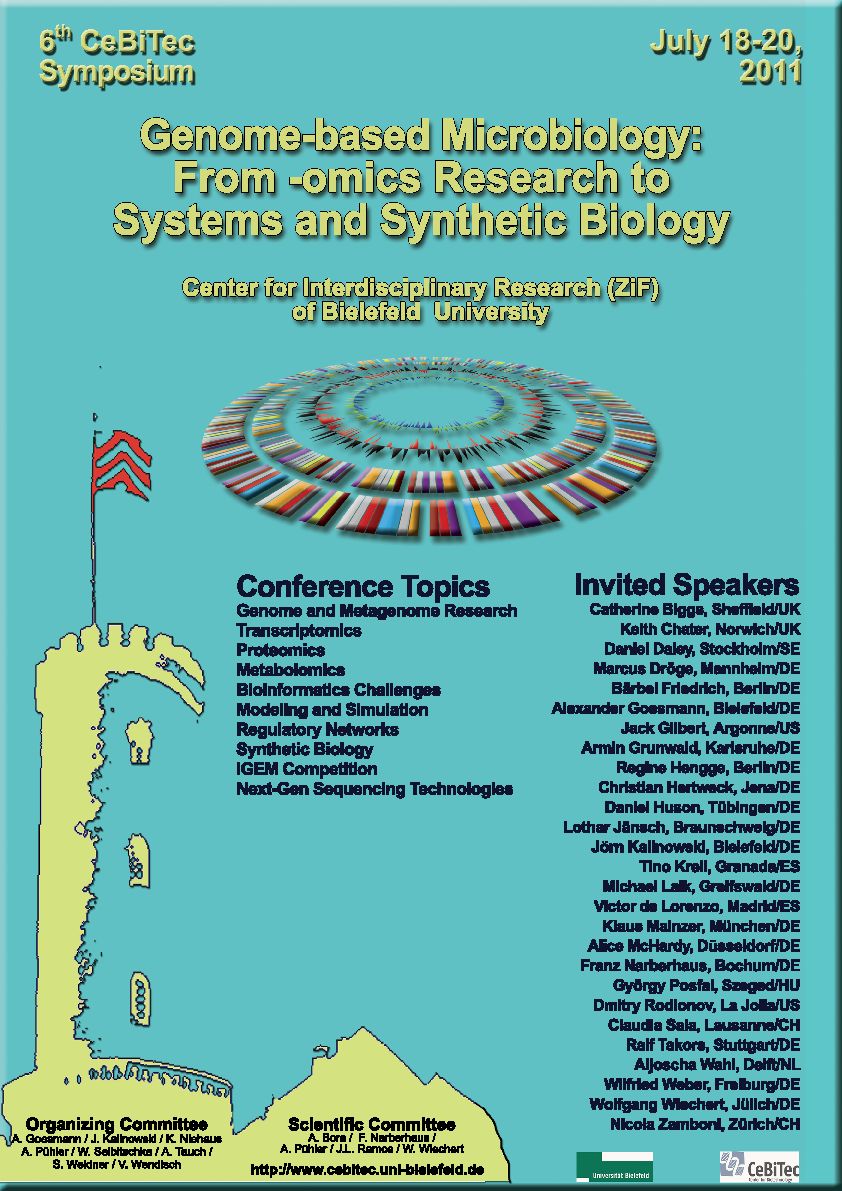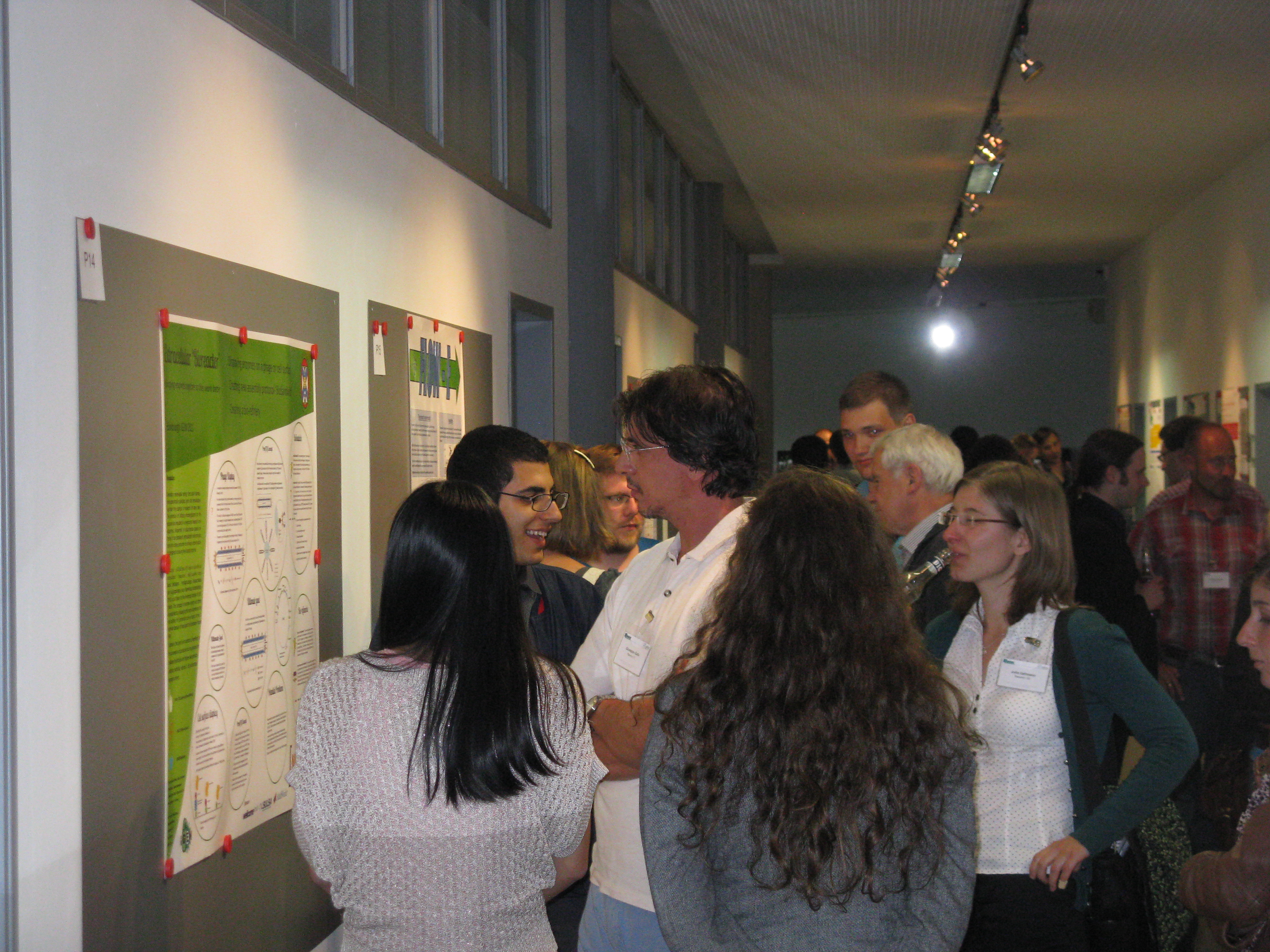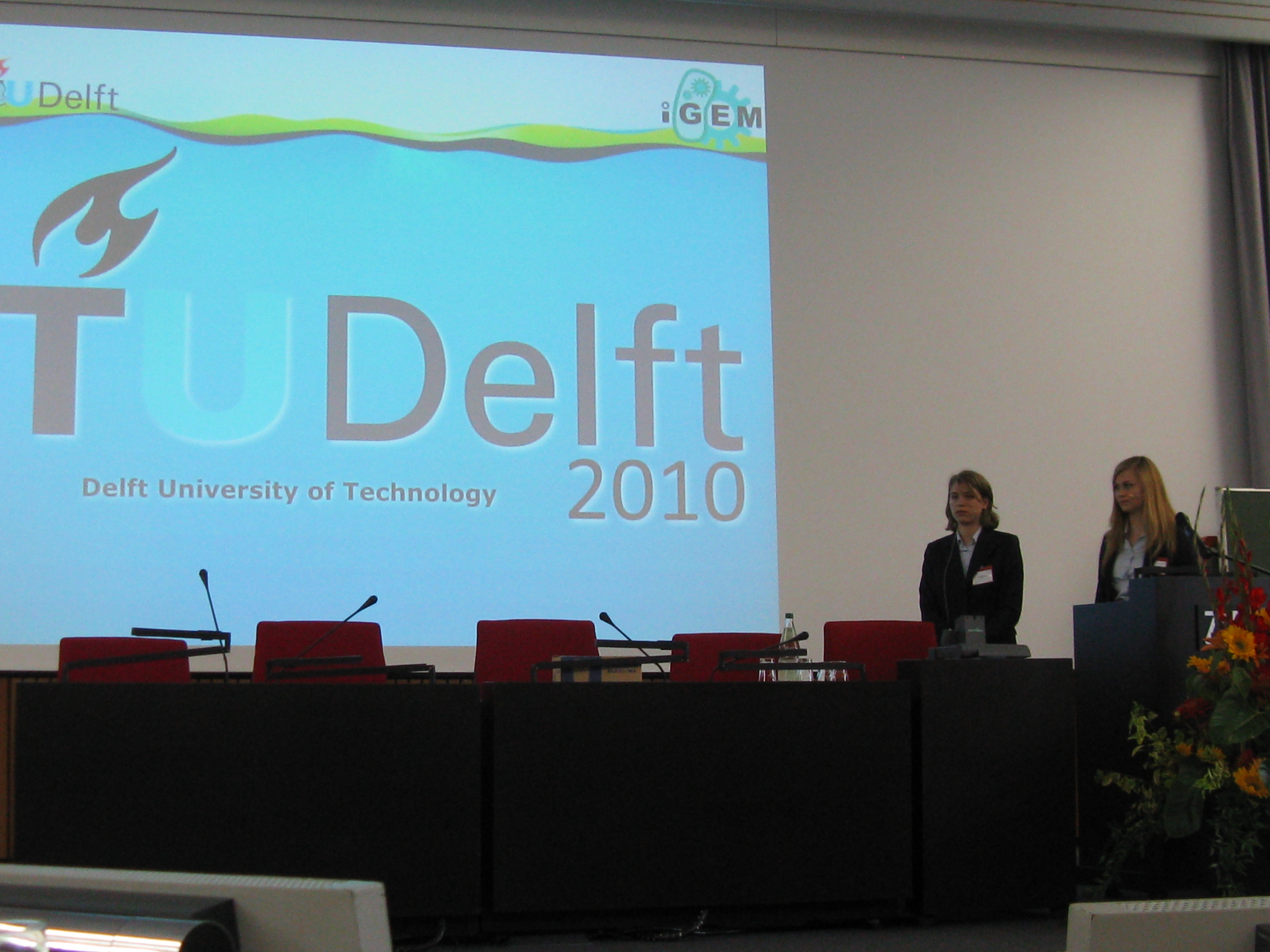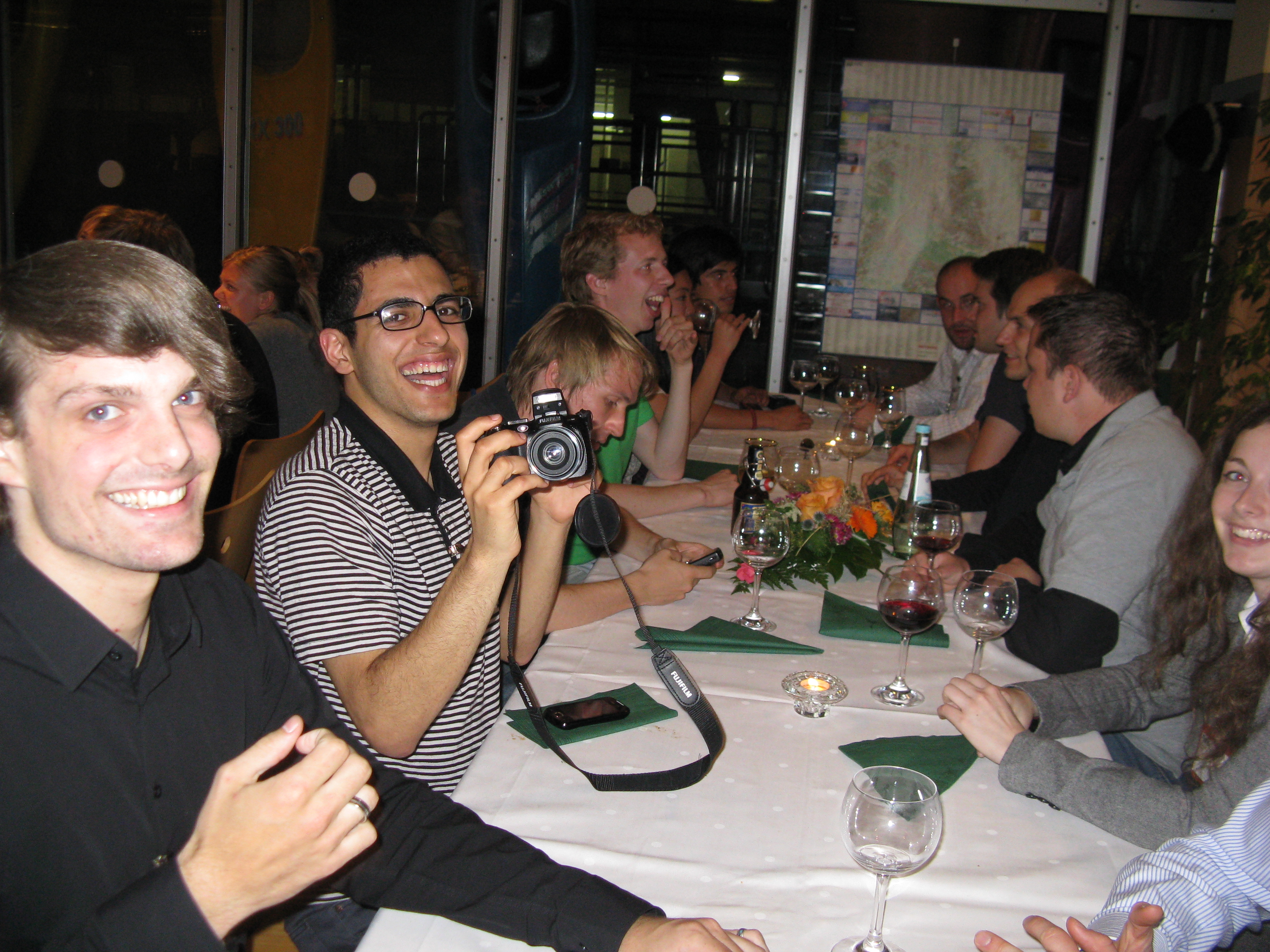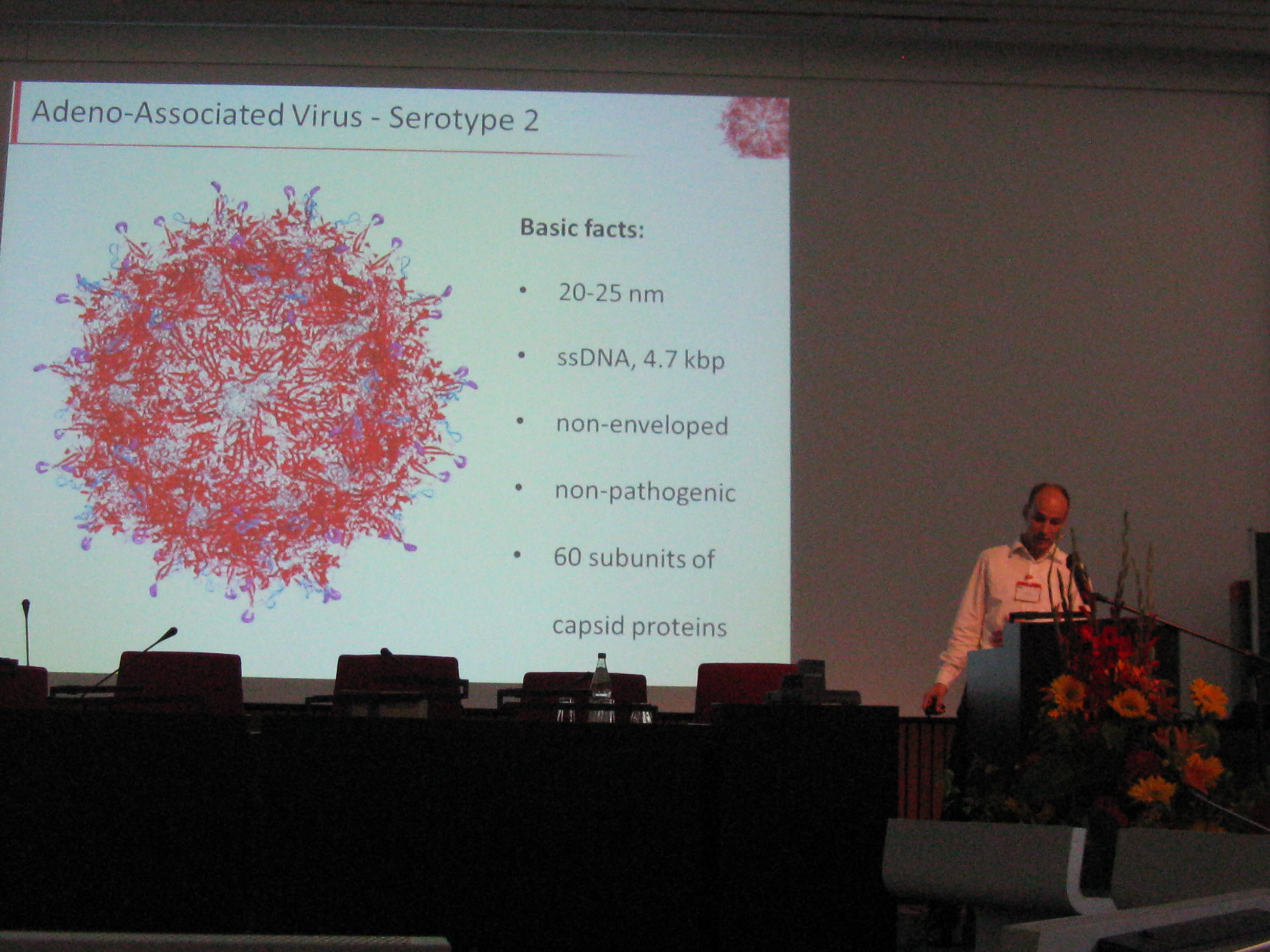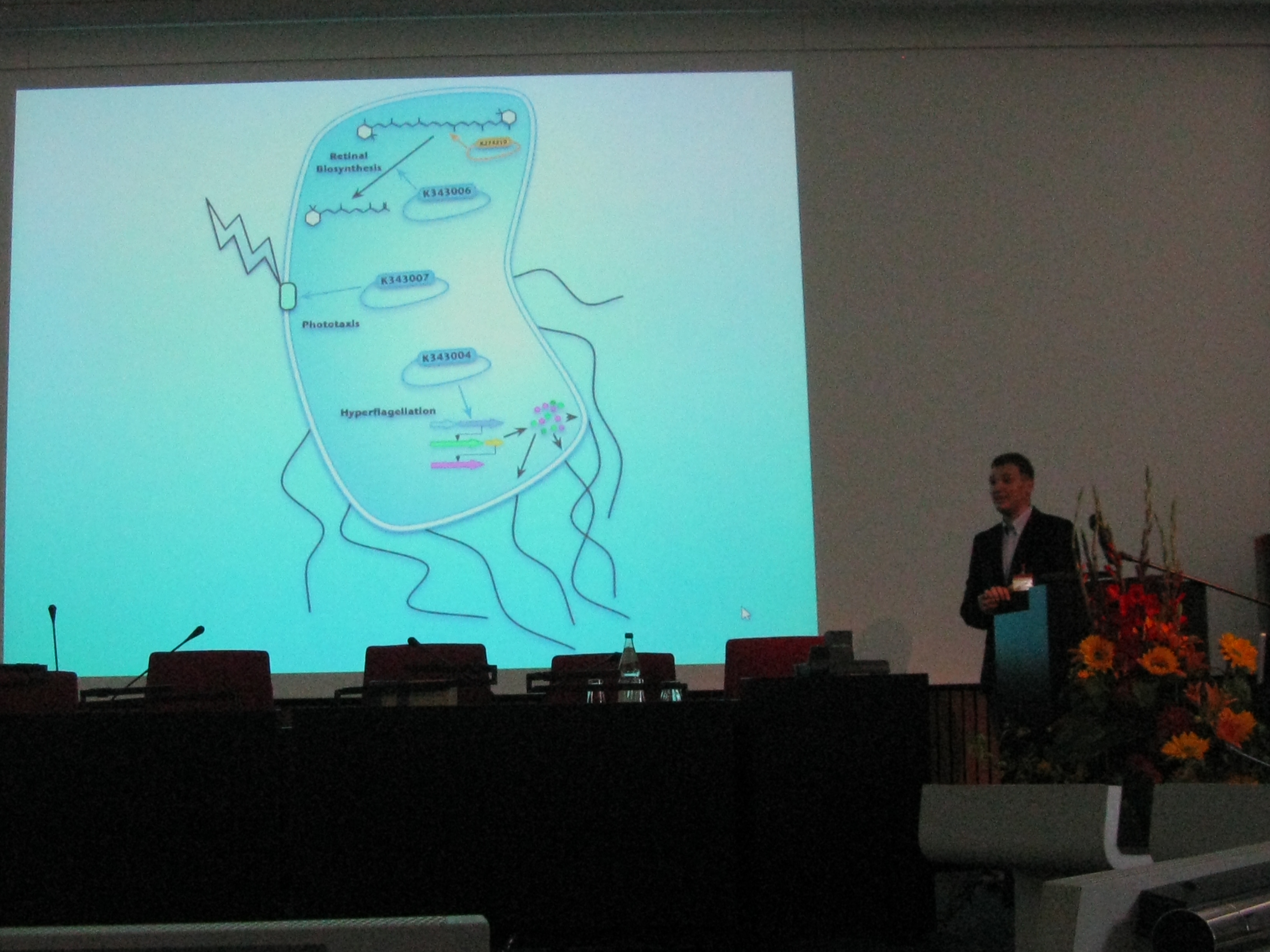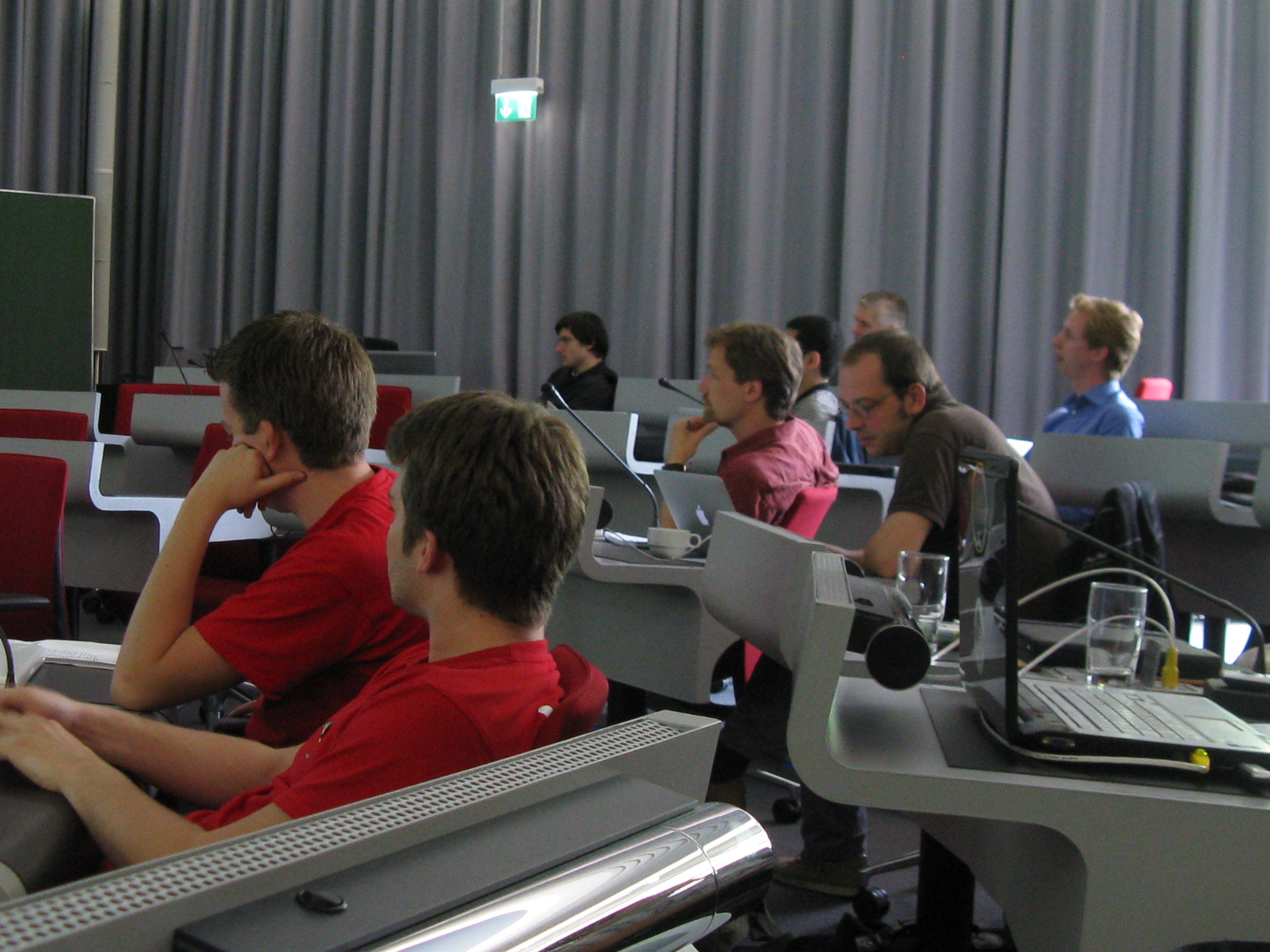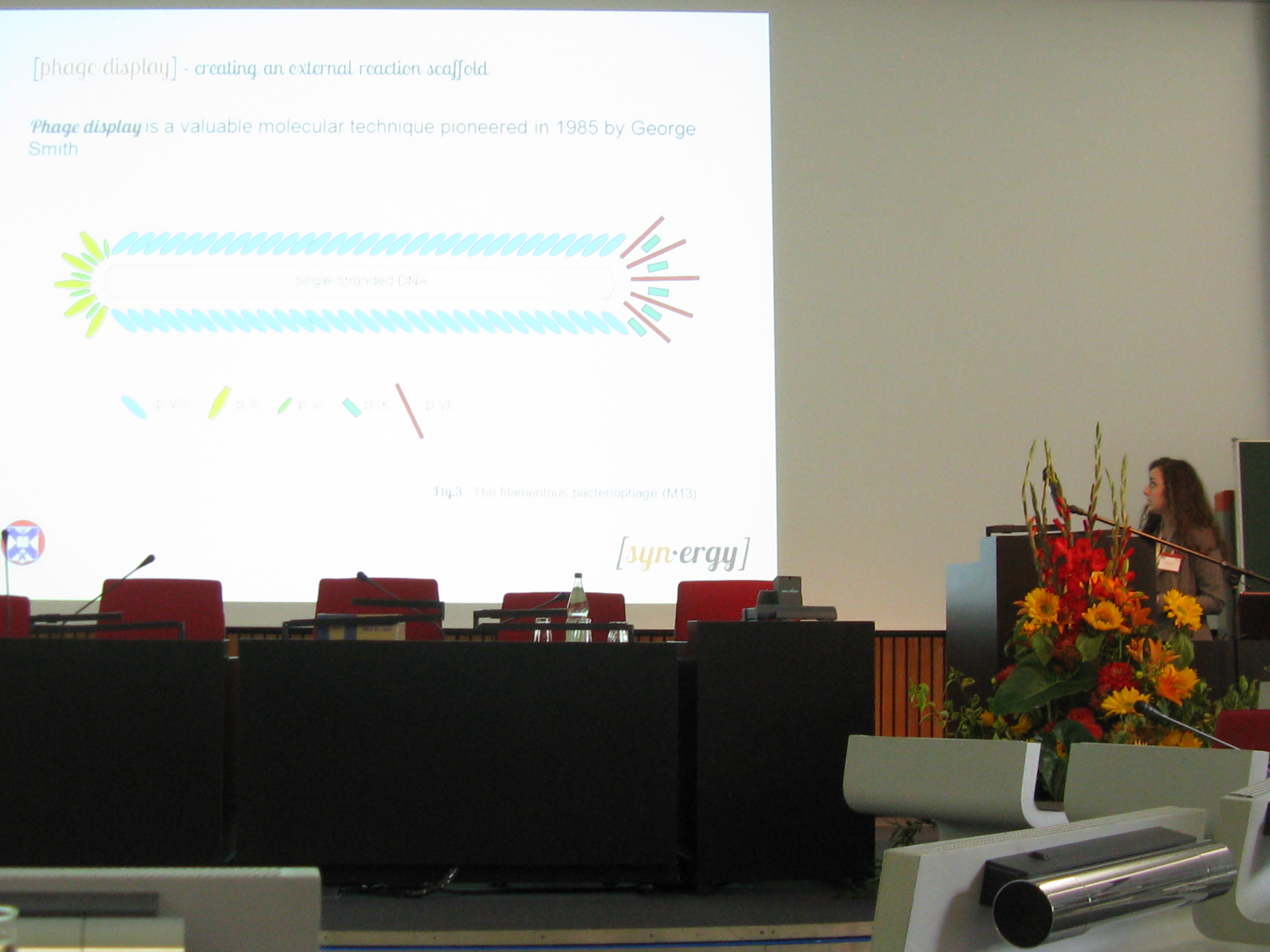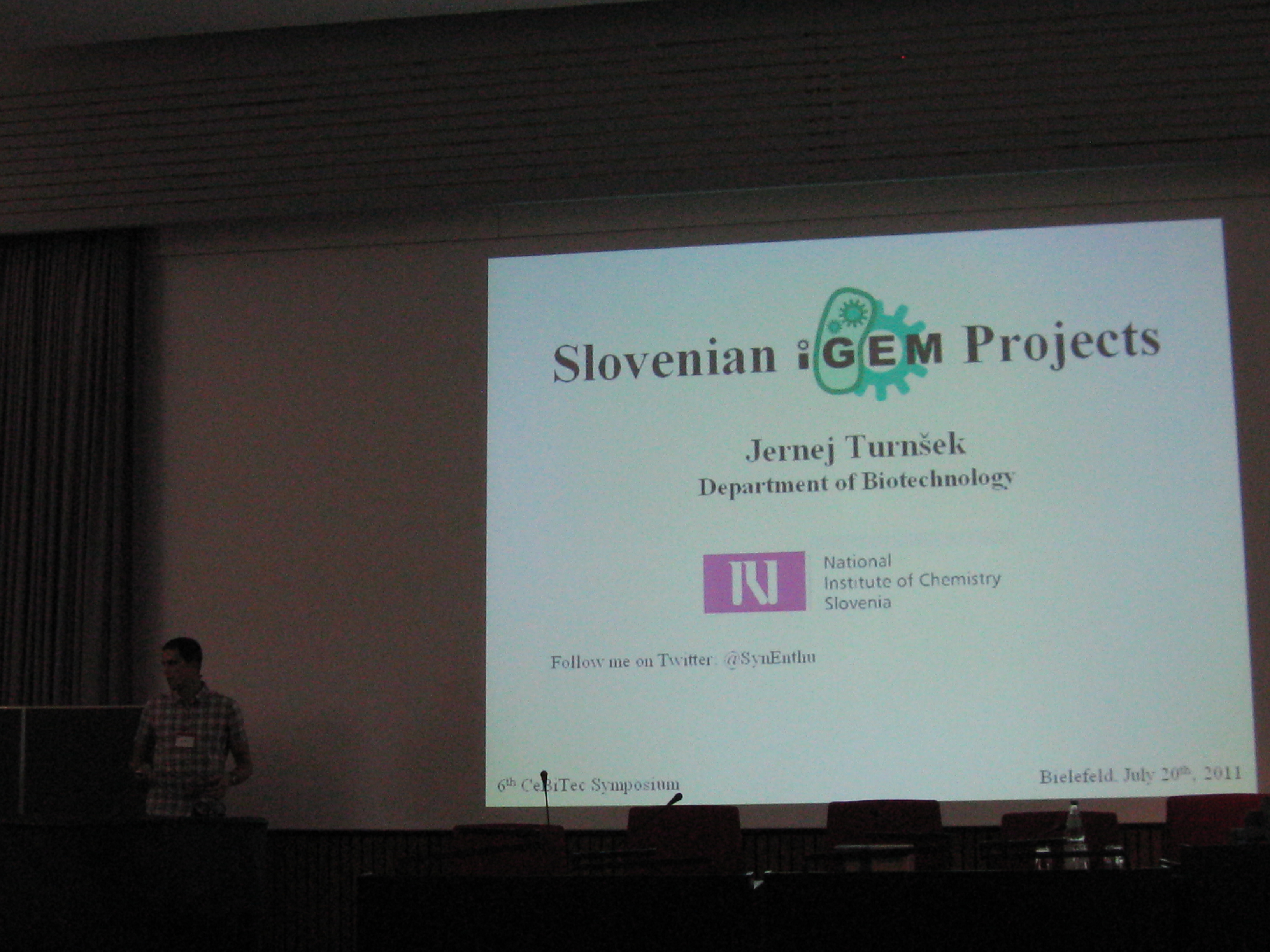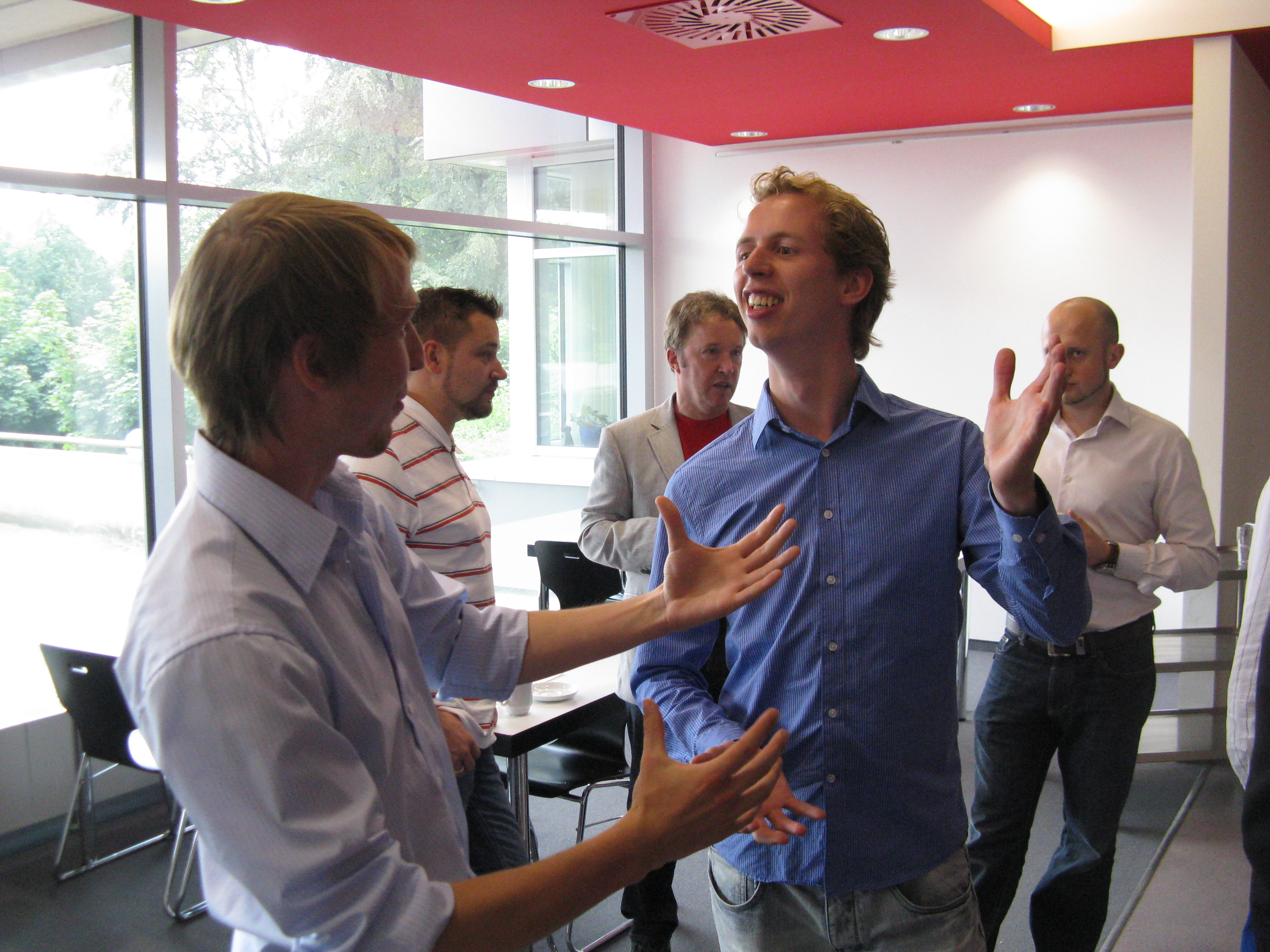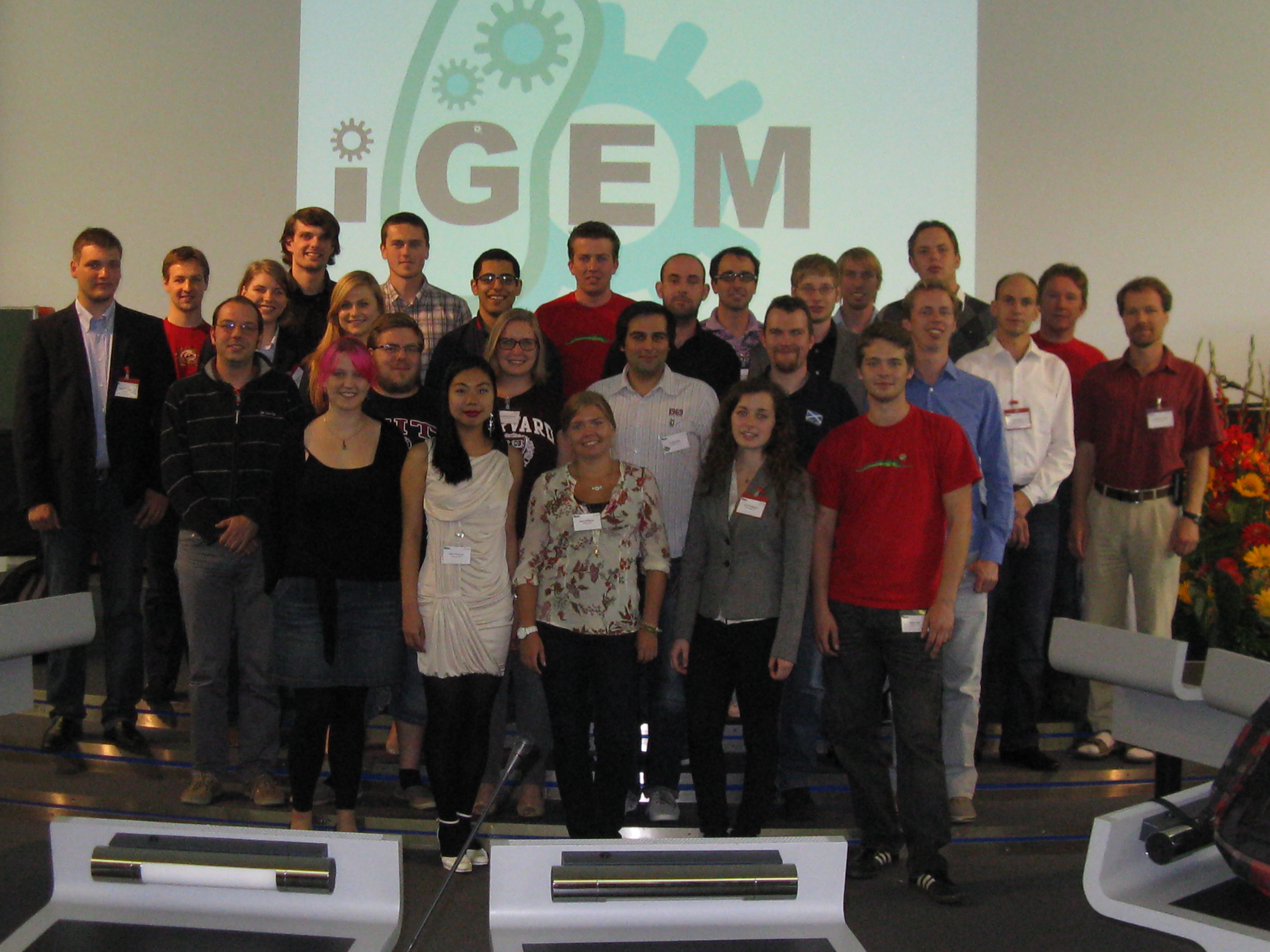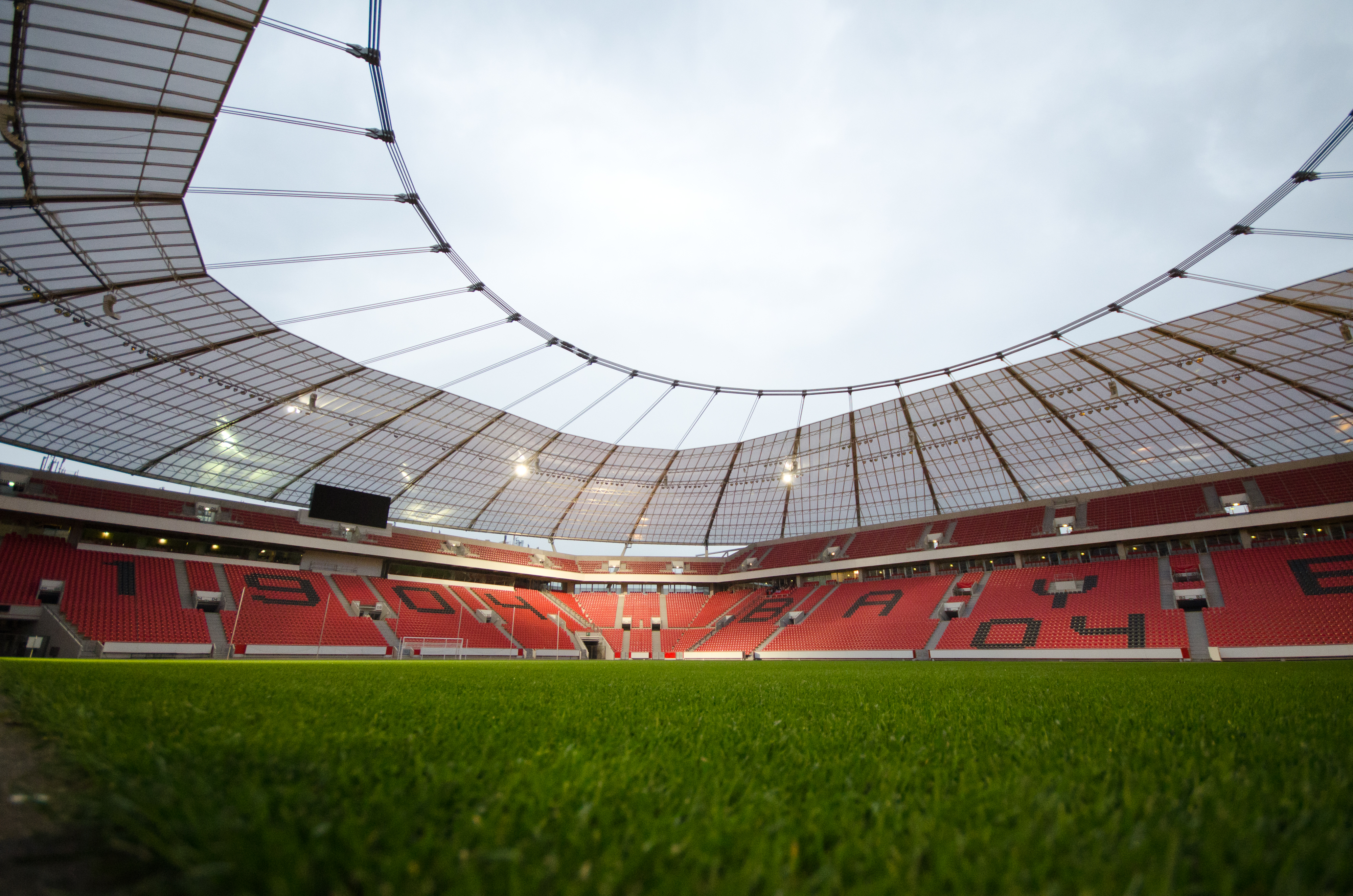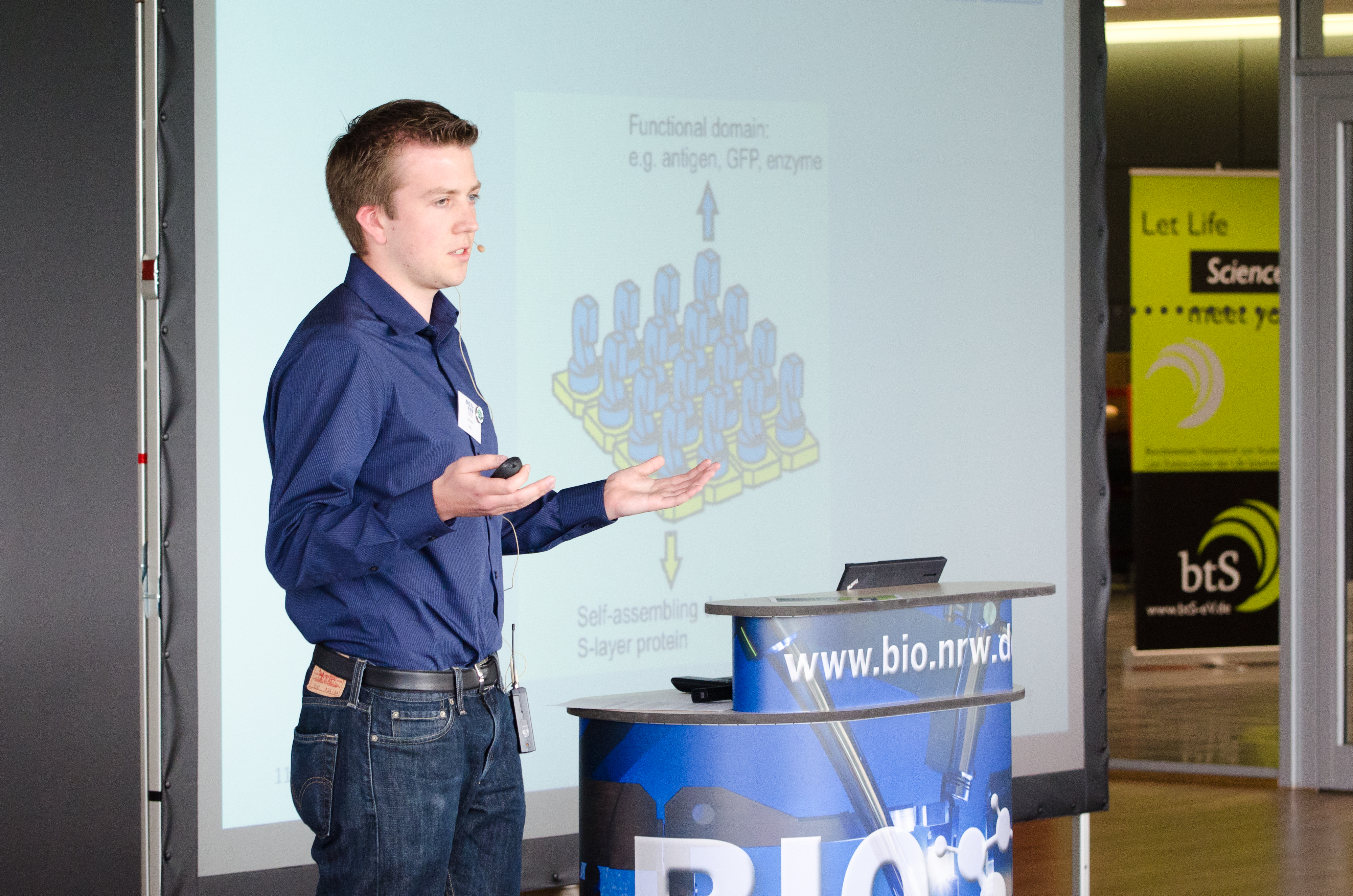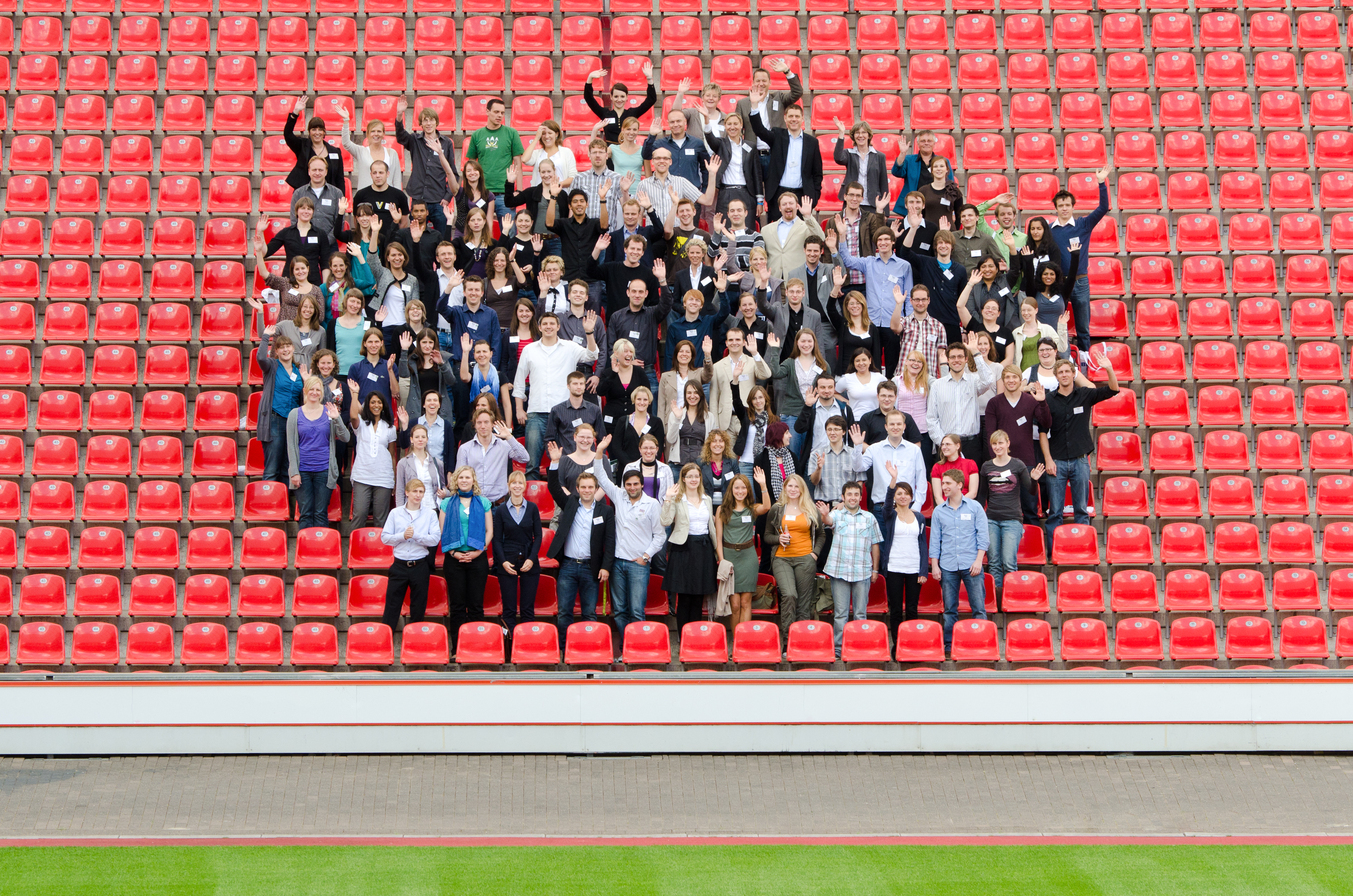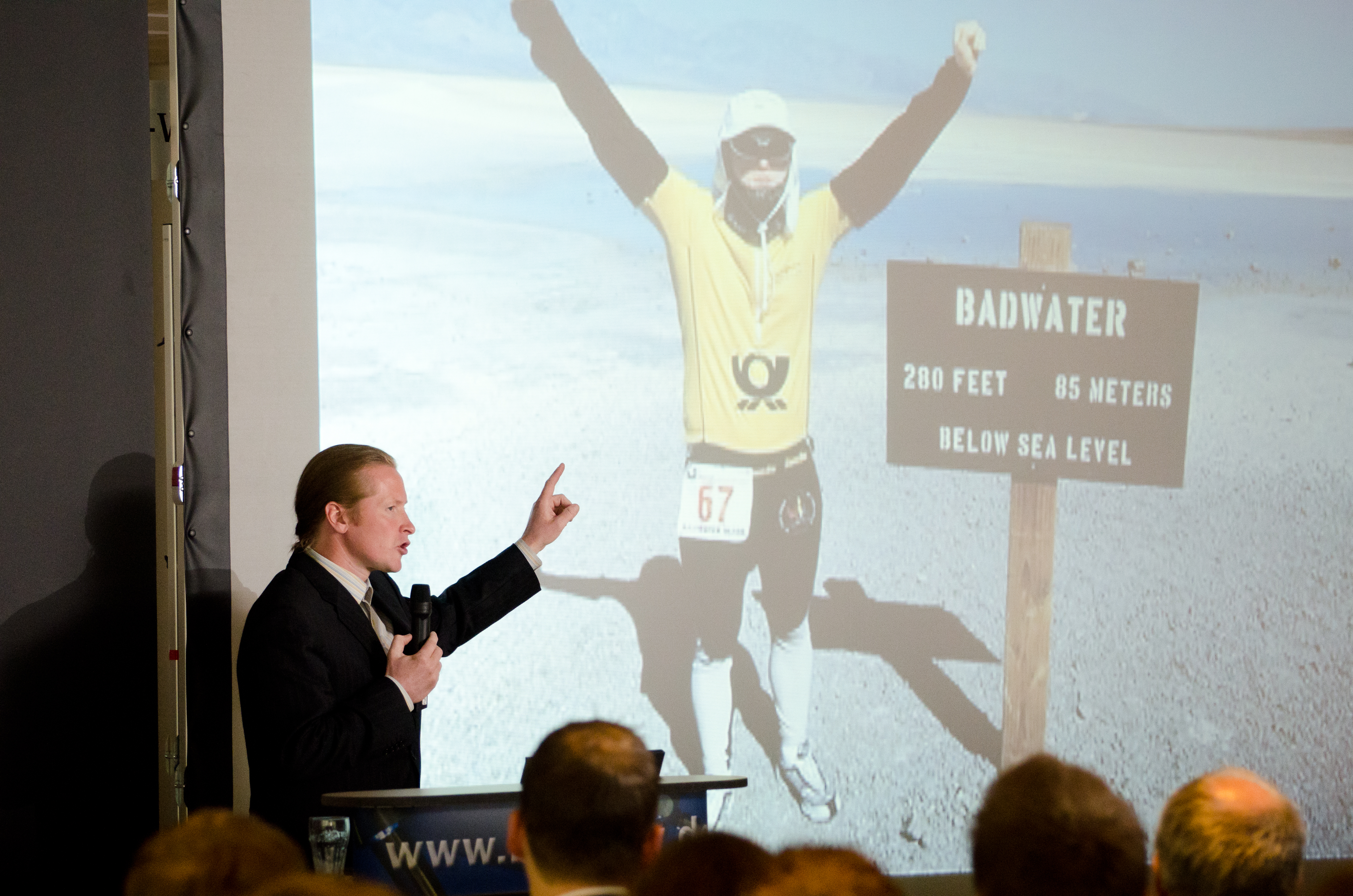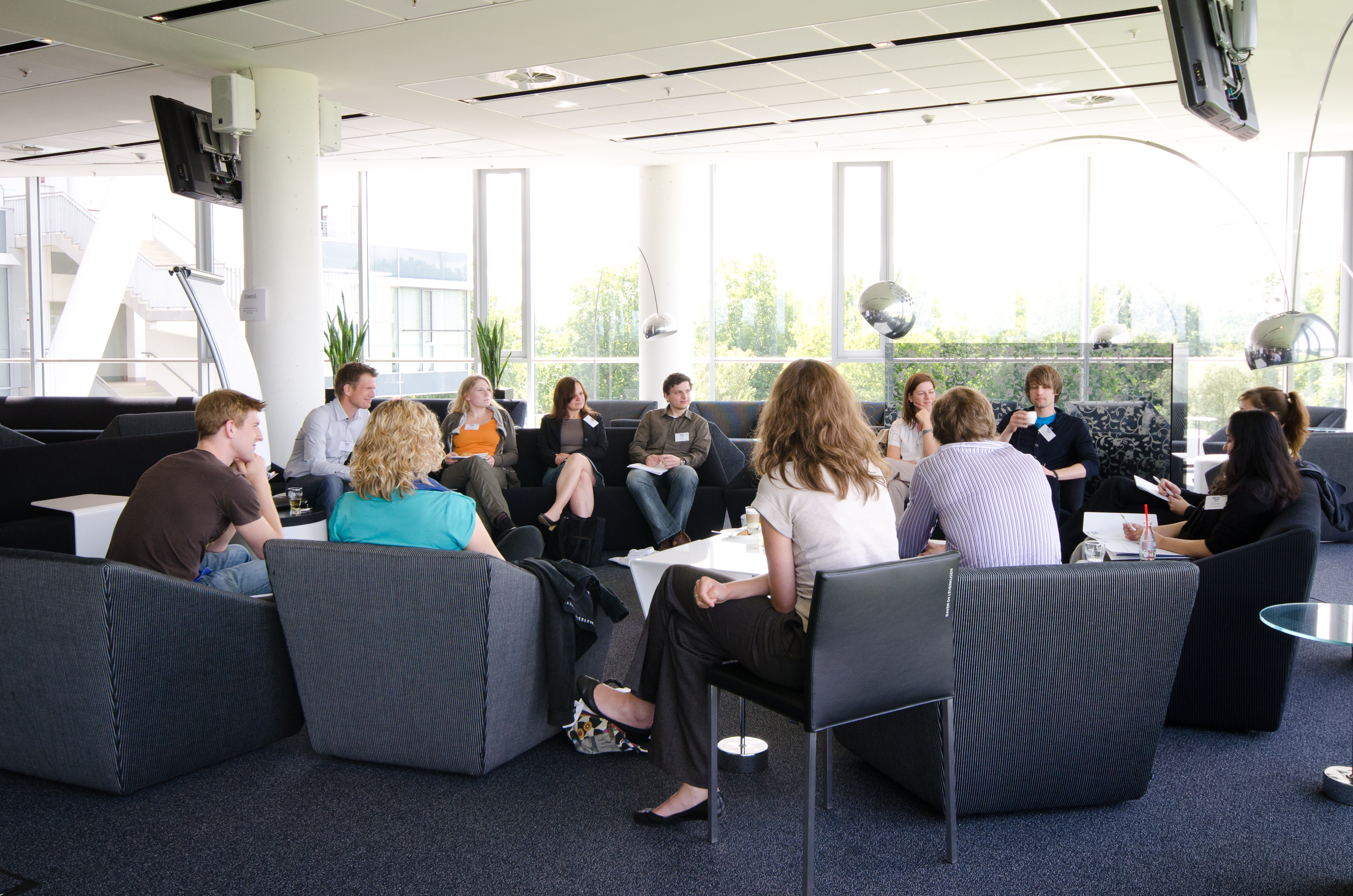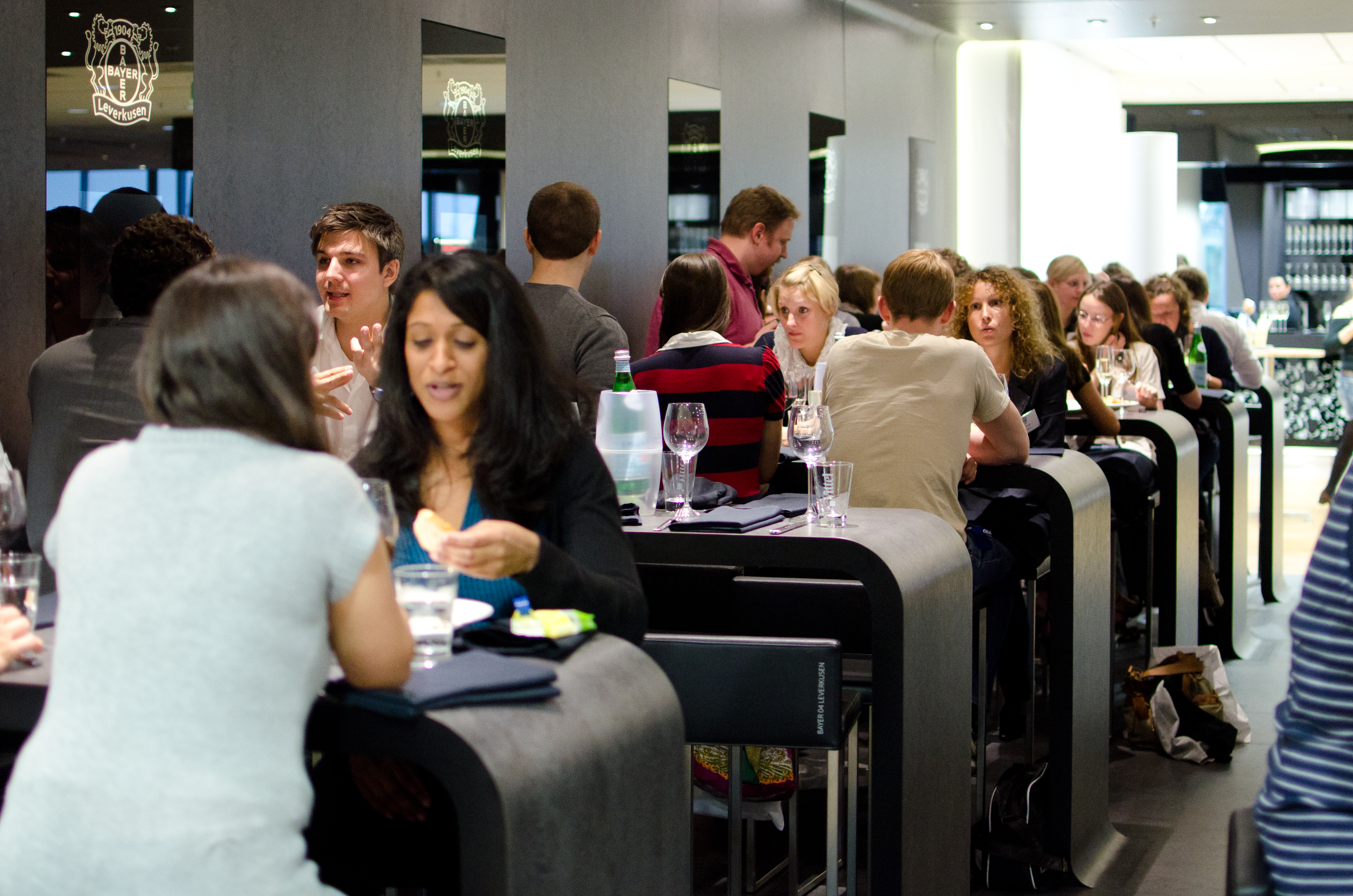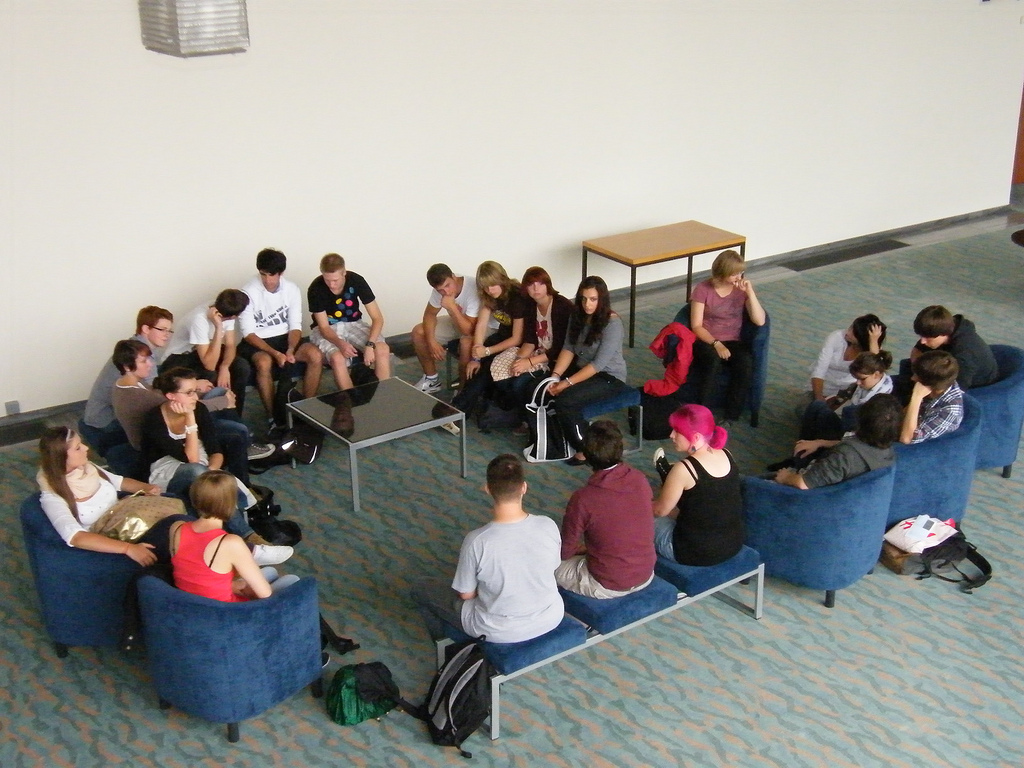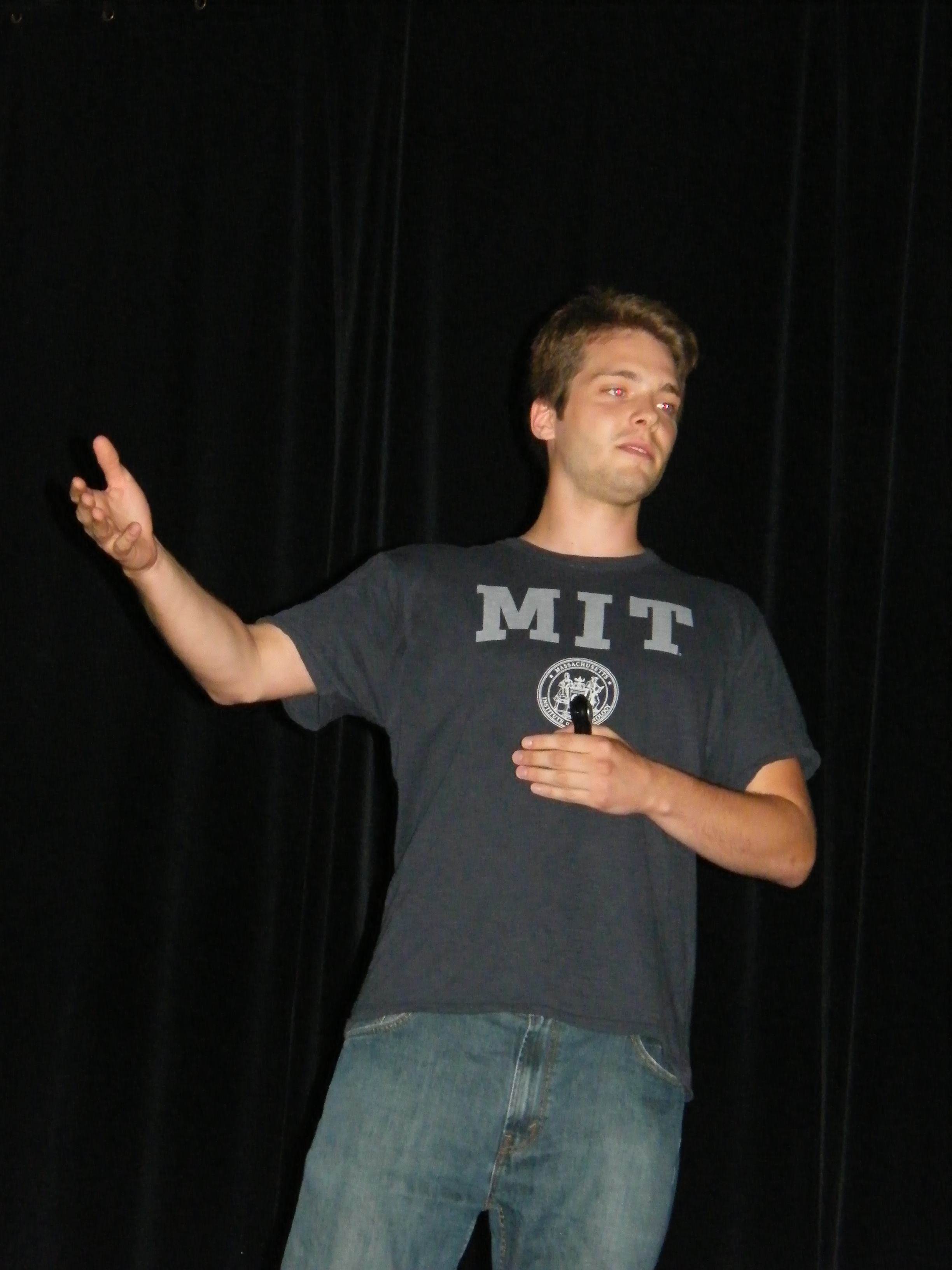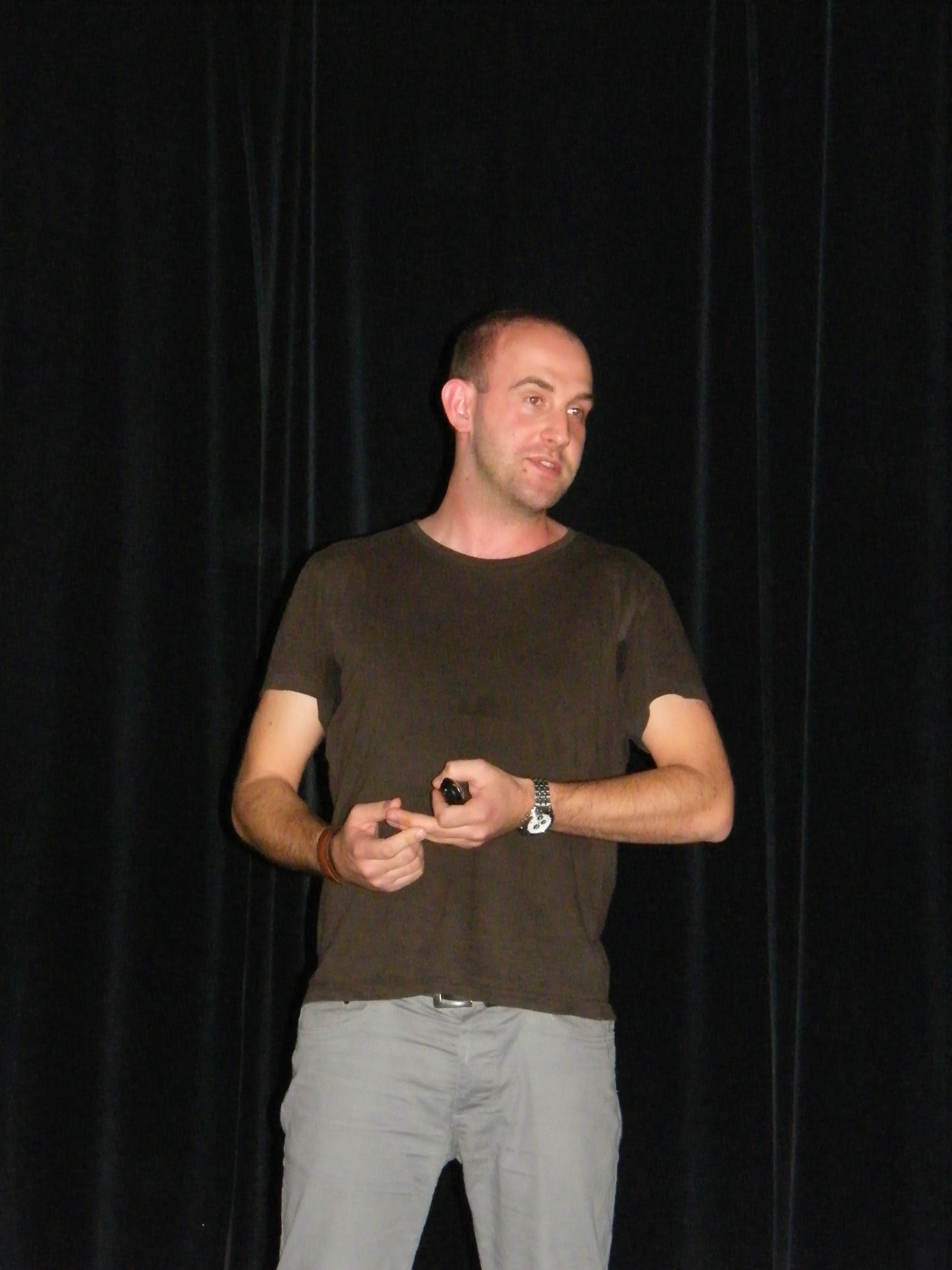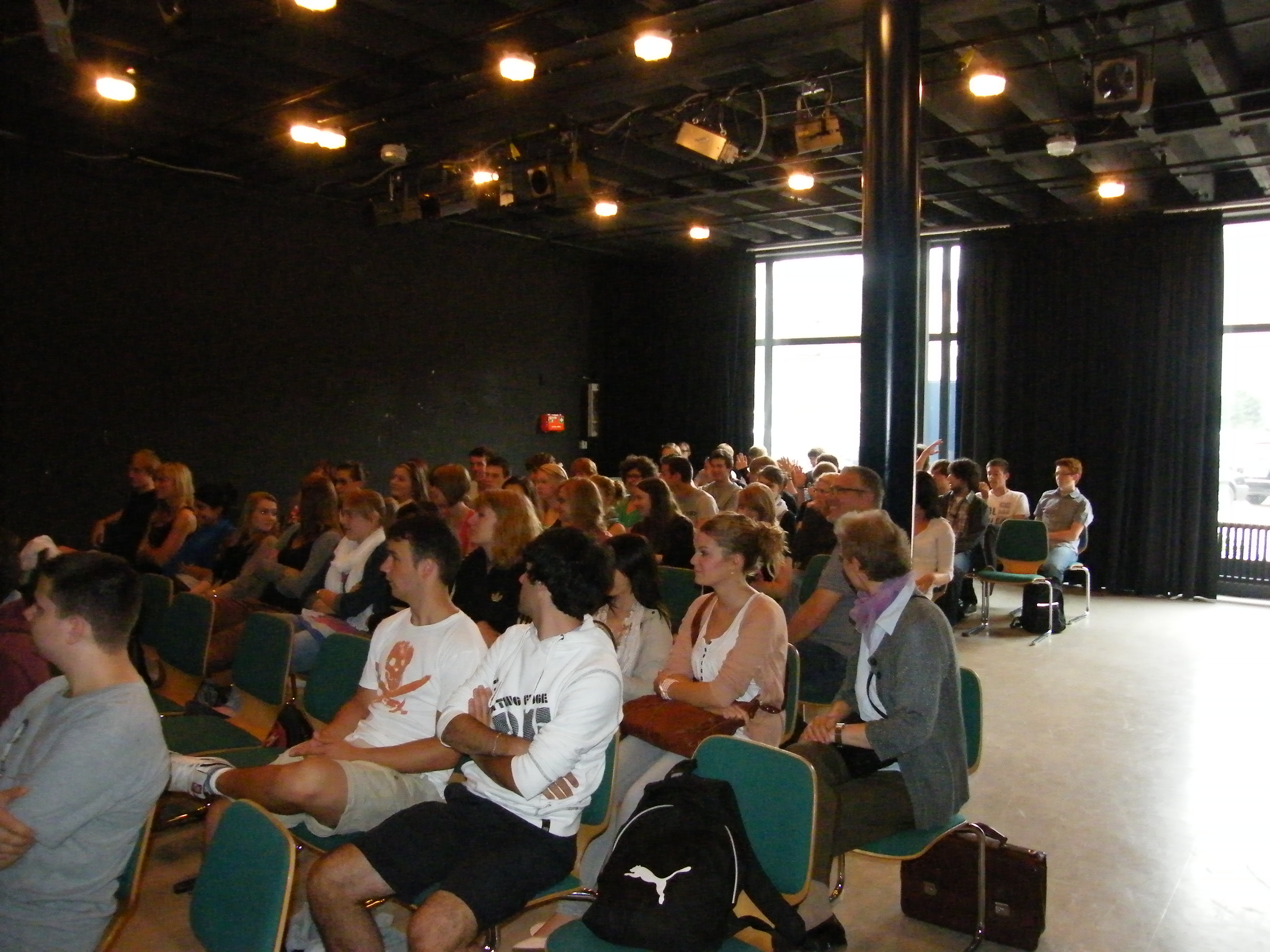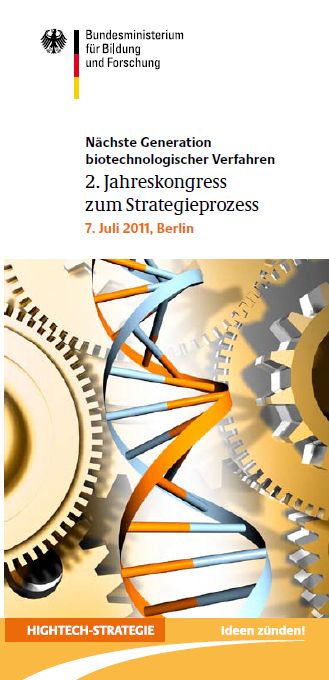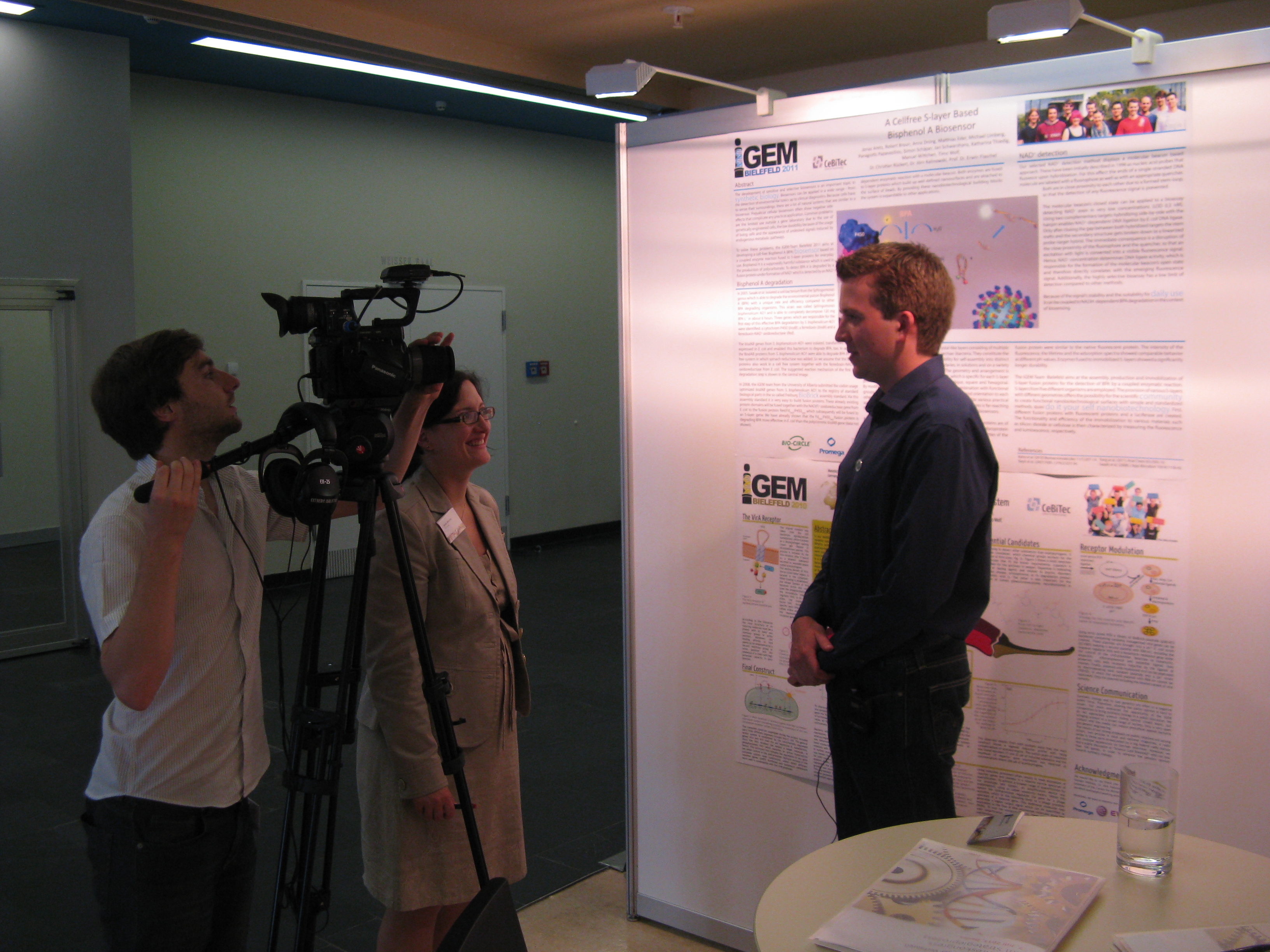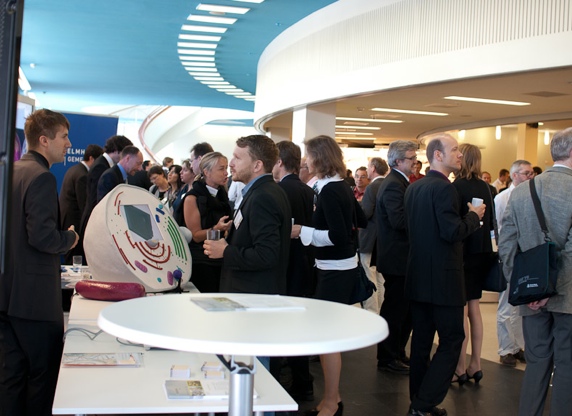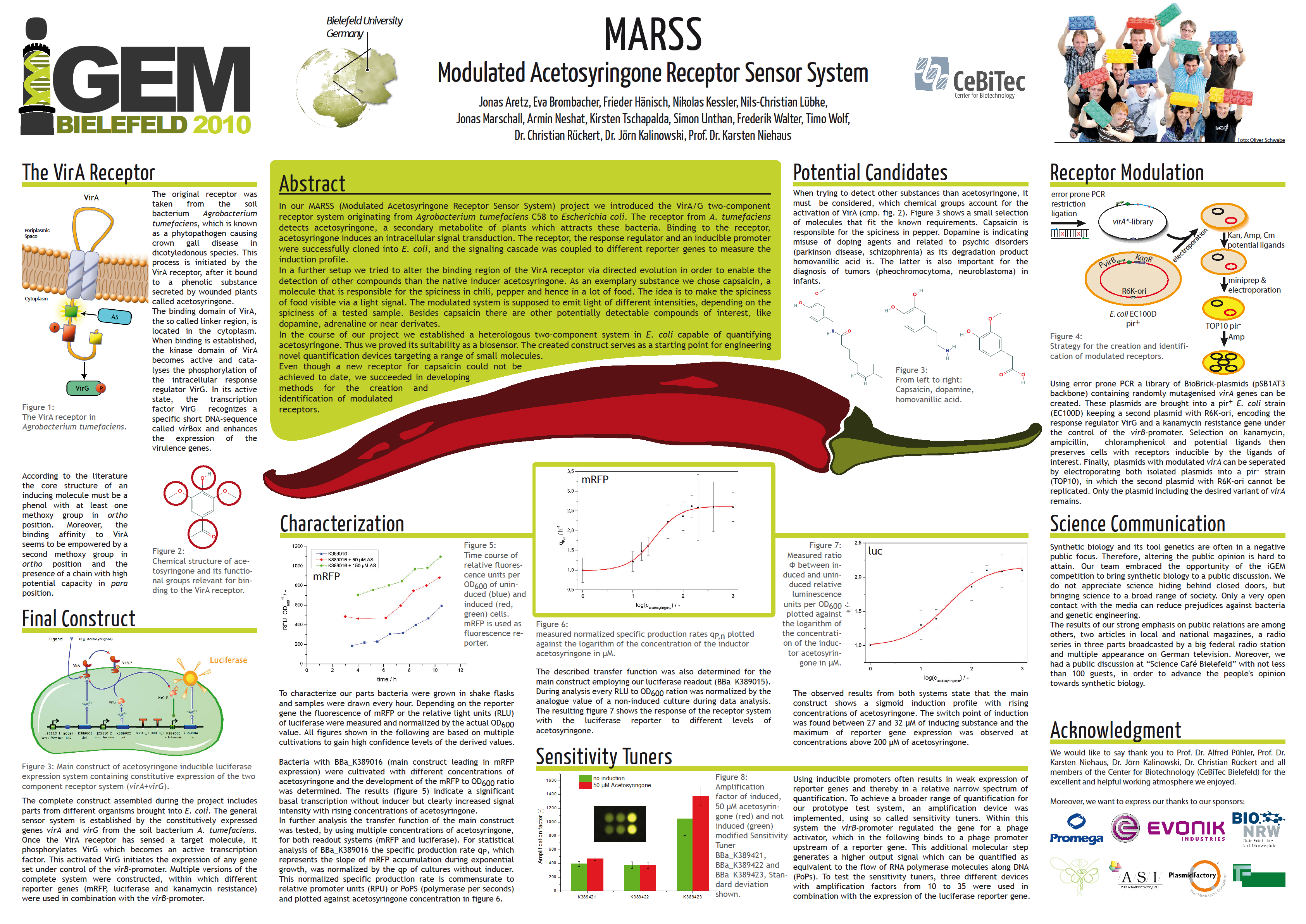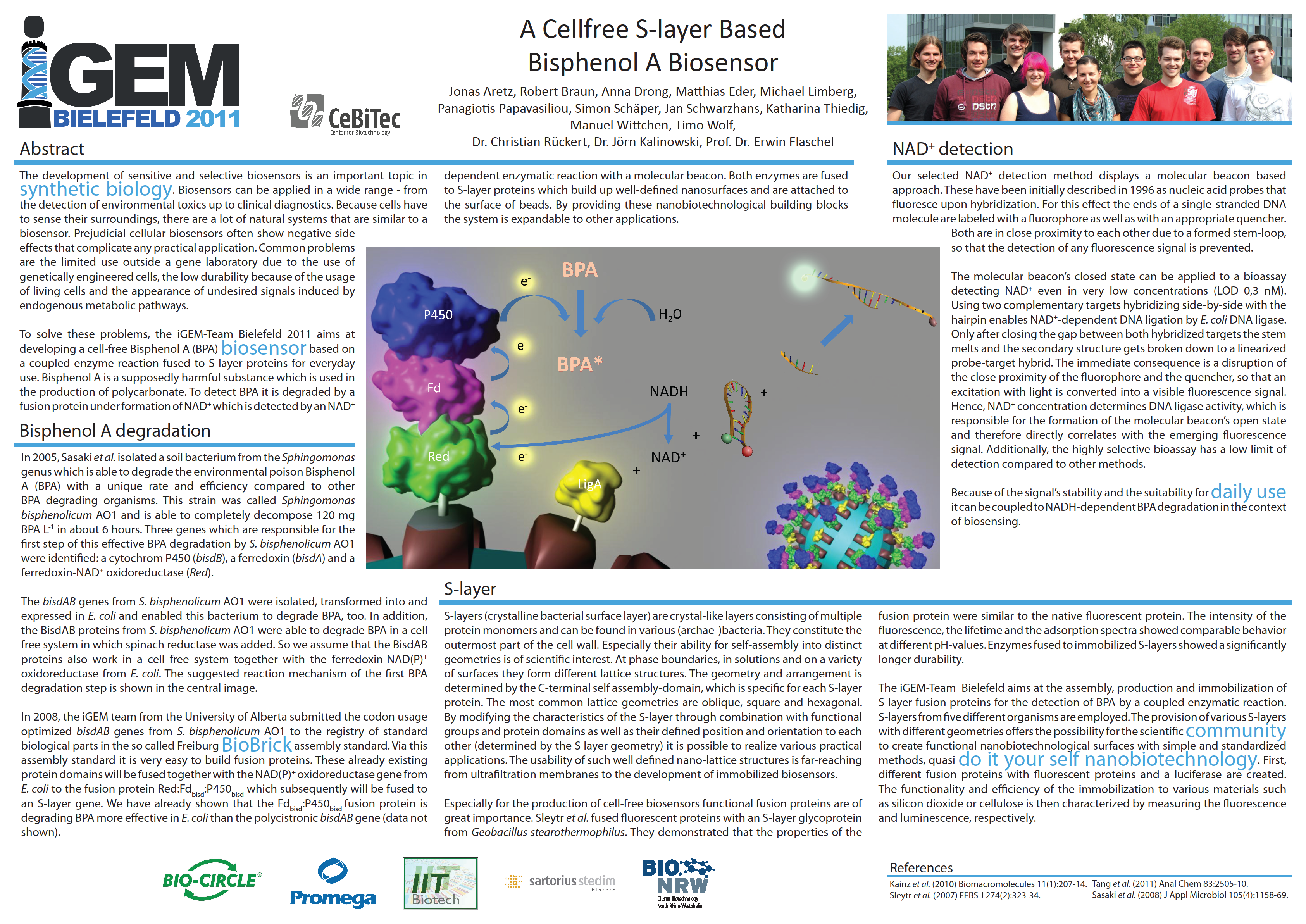Team:Bielefeld-Germany/Public relations
From 2011.igem.org

Contents |
6th Cebitec Symposium
European iGEM teams meet in [http://en.wikipedia.org/wiki/Bielefeld Bielefeld, Germany]
A review on the [http://www.cebitec.uni-bielefeld.de/content/view/209/88/ 6th CeBiTec Symposium] Genome-Based Microbiology: From -omics Research to Systems and Synthetic Biology
The annual CeBiTec Symposium, first held in 2006, deals with prospective topics in the broad spectrum of biotechnological research. Each year international scientists come together in Bielefeld setting the focus on current innovations, approaches and methodologies. The issues so far included [http://www.cebitec.uni-bielefeld.de/cebitec/symposium/sbf2008.html Solar Bio-Fuels (2008)], [http://www.cebitec.uni-bielefeld.de/symposium/bioimaging bioIMAGING (2009)] and [http://www.cebitec.uni-bielefeld.de/symposium/nfmgr2010 New Frontiers in Microbial Genome Research (2010)]. The [http://www.cebitec.uni-bielefeld.de/content/view/209/88/ 6th CeBiTec Symposium] was held under the topic Genome-Based Microbiology: From -omics Research to Systems and Synthetic Biology took place between the 18th and 20th of July, 2011. As this year’s topic included Synthetic Biology, this offered the opportunity for the iGEM team Bielefeld to add an iGEM session to the symposium’s agenda. The students accommodated five teams from all over Europe to present and discuss their past and future projects in front of the international scientific community.
Starting with one of the last year’s finalist TU Delft’s 2010 iGEM project about the conversion of different hydrocarbon sources in aqueous environments, all attending teams presented their results and strategies. The team from the University of Southern Denmark, Odense, presented their 2010’s project Flow E. The aim was to develop a biological system, which is able to generate flow in a fluid-filled tube by inducing the flagella movement with light by the use of a photosensor. This year’s iGEM Team from the University of Edinburgh aims to use and convert plant biomass, especially cellulose, to fermentable sugars like glucose. Therefore several cellulases are fused to a coat protein of the M13 bacteriophage. Ultimately the team’s goal is to create a biorefinery system to convert complex glucans into higher value products. The last year’s medicine track winner Freiburg presented their virus construction kit for therapy use. They managed to create different BioBricks and devices for individual virus construction. Last year’s grand prize winner Slovenia gave the audience a brief historical overview of all Slovenian iGEM projects so far. The session closed with the talk of the Team Bielefeld dealing with their topics from 2010 – a modulated two component sensor system for detection of capsaicin – and a preview for 2011 – nanobiotechnolgical S-layer based Biosensor for bisphenol A.
Additionally, the students used the opportunity to share and exchange their iGEM experience and their ideas of Synthetic Biology at the symposium and at the social events provided by the iGEM Team Bielefeld. The symposium’s iGEM session was a success and hence indices that the iGEM idea reached the scientific community.
Some expressions from the CeBiTec Symposium:
2nd BIO.NRW (PhD) Student Convention
The iGEM Team Bielefeld was honored with an invitation to the [http://www.bio.nrw.de/studentconvention 2nd BIO.NRW (PhD) Student Convention] at the [http://en.wikipedia.org/wiki/BayArena BayArena] in [http://en.wikipedia.org/wiki/Leverkusen Leverkusen]. The congress gives lifesience (PhD) students the opportunity to meet representatives of industry and academia, get information for career entry as well as improve their soft skills in workshops. Apart from the opportunity to participate in the convention, the role of the iGEM Team Bielefeld was to give a project presentation about iGEM as an example for remarkable scientific dedication during academic studies. The VIP-lounge in the stadium of the national league soccer team [http://www.bayer04.de/B04-ENG/en/_site_index.aspx Bayer Leverkusen] served as the venue for the two day congress.
The first day began with interesting talks about the perspectives, possibilities and opportunities in the pharmaceutical and healthcare industries given by company representatives. One of the highlights was the key note speech “No Limits” by [http://en.wikipedia.org/wiki/Joey_Kelly Joey Kelly], a former well known musician and now extreme athlete. The diverting talk showed how you can accomplish your goals with motivation, commitment and persistence. The supporting program featured a stadium tour, dinner and a relaxed evening on the grandstand.
For the 110 participants the second day started with workshops moderated by professionals coaches. The topics were for example improvement of soft skills or project presentation. Furthermore some of our team members took part in a workshop for communicating biotechnology, which has a special relevance for the public relations in our iGEM project. The workshops were all moderated by professionals
In the afternoon it was time for our iGEM project presentation. We focused on iGEM in general, the main principle of standardized DNA parts, example projects, the motivation behind participating in a competition like iGEM and gave an overview how to build up a project from the sketchbook to the final product. Bielefeld University has still the only iGEM team in the federal state of [http://en.wikipedia.org/wiki/North_Rhine-Westphalia North Rhine Westphalia], one of the most populated regions in Europe and host of the convention. Therefore our goal was not to present scientific results, but to talk about what is special in projects like iGEM and encourage other students and faculty members to start a new iGEM team in their own schools.
The whole event was a success for us as a team, since we had lots of fun and learned new aspects in the workshops. Most importantly we were able to present about iGEM and show new people what is special about the iGEM spirit as well as open source biology.
Abstract of our talk
The iGEM (international genetically engineered machine) competition enables the
possibility for students to fulfil their own biological project. It is an international
competition dealing with synthetic biology, in which undergraduates can participate.
Once a year it is arranged by the MIT (Massachusetts Institute of Technology) in
Boston, USA. Under the umbrella term „Synthetic Biology“, teams with a multitude
of backgrounds in life sciences as well as software development, design and art
teams can participate. So the project topics are broadly diversified. All teams
start with the same toolbox of standardized DNA parts – the Biobricks. These
parts combined with new designed Biobricks are used to build novel biological
systems in living cells. Further focuses of the competition are biosecurity and the
bioethical aspects of synthetic biology. These aspects are taken into account in
public discussions.
In 2011 more than 150 teams from all over the world will be
participating. The teams have to do all the logistical and organisational work as
well as public relations. This includes providing labspace, organizing a manageable
time schedule and accomplishing all the fundraising on their own. Another main
focus is the scientific communication of synthetic biology, the iGEM competition
and the student‘s project. All in all the students will perform a self-organised project
from the sketchbook to the final product.
The last year’s project of the iGEM team Bielefeld concerning a biosensor for spiciness was honoured with a gold medal. In 2011 the iGEM team Bielefeld is participating for the second time. The students will create a cell free analytical system for the detection of environmental toxics, which is fused to molecular self assembly systems (S-layers).
We want to thank [http://www.bio.nrw.de/en BIO.NRW] for hosting this great event and giving us the opportunity to give a presentation.
The iGEM Team Bielefeld at a local high school
Though synthetic biology (SB) is going to be the next big thing in biology, its researches are always raising public concerns respectivly are always in the focus of a public opinion. Therefore we got in contact with a local high school, in order to get an impression of the public awareness concerning synthetic biology. Hence we discussed with pupils about pros and cons of Synthetic Biology, iGEM and our projects as examples for applications. About 80 seniors from different biology and chemistry A-level courses came to the school's assembly hall and listened to our presentation, followed by questions. Afterwards the students were split into smaller groups of ten to twenty people and got accompanied by members of the Bielefeld iGEM team to discuss about iGEM and SB.
In Germany the topic of SB has generally not reached the education in high schools yet. Lab courses with genetically modified organisms (GMO) are not possible due to the lack of accredited laboratories and equipment. Federal laws do not allow to work with GMOs outside a security level 1 laboratory. For those reasons, the subject matter of SB is an interesting and new field for most pupils. Our goals were to awake the public opinion, prevent fear, start public discussions and participate in the outreach about iGEM. We think that theses aspects are important topics when talking to pupils, because this is the next unbiased generation having to face prejudices and misunterstandings about SB. Further this is the generation Bill Gates ment when telling Wired that if he were a teenager today, he would be hacking biology ([http://www.wired.com/magazine/2010/04/ff_hackers/5/ WIRED]).
We began with presenting the general principles of SB by talking about combining engineering and biology, standardized parts and the construction of new systems with novel functionalities. Further we talked about iGEM in general, the Partsregistry, our team and some example projects to show what is possible when working with BioBricks. We aimed at simplyfying the whole topic to an understandable level, by comparing our bacteria with smartphones, BioBricks with apps and the Partsregistry with an appstore. To show the students what is special about iGEM apart from the scientific point of view, we presented what needs to be done during an iGEM project from beginning to end, how interdisciplinary and fun it is. We wanted to raise the attention to the fields of SB and iGEM. In the end we gave some short information about our university and the subjects we are studying.
To give the opportunity to ask questions or discuss ethical concerns with us we splitted the audience into smaller groups. Apart from questions about our study courses, how we manage our studies together with iGEM and the job opportunities after graduating, questions concerning SB and ethics came up. Below are some examples:
- “What are your concerns about bioterrorism? What is done to prevent bioterrorism?”
- “What were the winning projects from the last years?”
- “Is it theoretically possible to build a smelling computer with synthetic biology?”
- “Are there any disadvantages for european teams due to stricter laws?”
- “What can be done with BioBricks apart from glowing bacteria?”
- “Where should the boundaries for SB concerning ethics be set?”
- "What kind of job do I get with knowledge in SB? And how does a working day will look like?!"
- "How would you describe a typical working day in the lab during the competition?"
This morning in a local high school was an important experience for the high school students and also for us. We got some insights about what pupils think and are concerned about when discussing SB. Surprinsingly there were not so much concerns about our work as aspected, though the pupils already gave thought about general aspects of genetical engineering and SB. With the experience we gained we will improve our human practise work at the next big event we will be participating, the [http://www.geniale-bielefeld.de/ GENIALE], a one week science fair for all ages in Bielefeld. Further we promoted the open source principle behind iGEM, aroused some interest and hopefully prevented some fear when facing SB. All in all it was a great morning and as the public discussion is always an important part of iGEM, we encourage other teams to sometimes leave the lab and communiacte with the public.
We would like to thank Mr. Dirk Paul Stephan and the [http://www.rg-herford.de/ Ravensberger Gymnasium Herford] for giving us the opportunity to hold our presentation as well as to visit and talk to the pupils.
Strategic Process Biotechnology 2020+
The German [http://www.bmbf.de/en/index.php Federal Ministry of Education and Research] manages the [http://www.biotechnologie2020plus.de/BIO2020/Navigation/DE/root.html Strategic Process Biotechnology 2020+]. Together with research organizations and universities the vision is to develop the next generation of biotechnological processes as well as initiate their realization. Apart from funding of research projects, expert talks on the topics medicine, energy, environment and industry are arranged. Every year a [http://www.biotechnologie2020plus.de/BIO2020/Navigation/DE/root,did=128308.html highlight congress] is organized, where representatives from academia, industry and politics meet to discuss the future of biotechnology. This year, parts of the iGEM Team Bielefeld were invited to actively participate and present posters about the 2010 and 2011 projects.
The event began with the address of welcome by State Secretary [http://www.biotechnologie2020plus.de/BIO2020/Navigation/DE/root,did=128308.html Dr. Helge Braun], followed by keynote speeches of industry representatives. Afterwards it was time for a coffee break and the poster session. Last year’s Freiburg and Weimar-Heidelberg Arts team as well as this year’s Potsdam team were also there so we could team up after the poster session. The iGEM team Bielefeld was able to present a poster of our 2010 MARSS (Modulated Acetosyringone Receptor Sensor System) project and a poster of our 2011 Cellfree S-layer Based Bisphenol A Biosensor.
As the congress was in the beginning of July, we did not present any results of our 2011 project, but showed what our concept and idea is. A lot of people were interested in the concepts of Synthetic Biology, iGEM in general, ethical discussions and the shown projects. Inspired by our posters we had some interesting talks and debates with representatives from academia, industry and politics. The expert audience showed a lot of interest, often asked for more detailed information or even suggested new and different applications for our cell free biosensors. Our project raised a lot of interest, because there was a big focus on cell free systems at the conference, so we fitted in quite well. These are supposed to be one of the visionary next steps in biotechnology. Apart from cell free systems, the strategic process points out the current trends in biotechnology. These are Systems biology, Bioinformatics, Synthetic Biology and BioBricks, as well as Nanobiotechnology, especially self assembling molecules. Witpout knowing this when choosing our project, this shows that we are working on an state of the art and innovative project.
The poster session was followed by a panel discussion and workshops on the future innovations of biotechnology. During the breaks and workshops we were able to further get in contact with the other participants and promote iGEM. Additionally to the whole scientific exchange, it was realy nice to get in touch and share some experience with the other iGEM teams.
For the iGEM team Bielefeld the Strategic Process conference was another great experience, to promote our project and to get in touch with a lot of new people. This event was special, because the participants were mainly composed of an influential expert audience. Additionally we gave an interview for [http://www.youtube.com/watch?v=YbEVZFPG_dY#t=4m23s biotechnologie.tv], which was broadcasted on August 22nd.
Posters we presented at the Strategic Process Biotechnology 2020+
We want to thank [http://www.biocom.de/ BIOCOM] and the [http://www.bmbf.de/en/index.php Federal Ministry of Education and Research] for hosting the event and for giving us the opportunity to present our posters.
Press about iGEM Bielefeld 2011
- [http://ekvv.uni-bielefeld.de/blog/pressemitteilungen/entry/mit_synthetischer_biologie_gegen_gift Press Release]
- [http://www.nw-news.de/lokale_news/bielefeld/westen/uni_fh/4699511_Mit_synthetischer_Biologie_gegen_Gift_in_Babyflaeschchen.html Neue Westfälische]
Workflow of an iGEM Project
To easily show how the workflow of an iGEM Project looks like, we have developed the folowing animation we used in some of our presentations:
File:Bielefeld-Germay-Workflow.gif
 "
"

